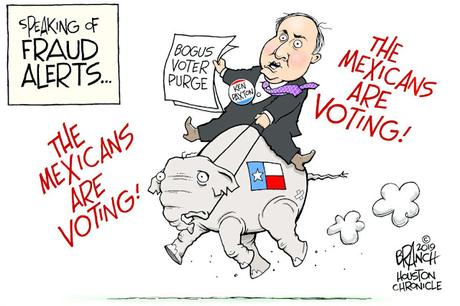 (Cartoon image is by John Branch in the Houston Chronicle.)
(Cartoon image is by John Branch in the Houston Chronicle.)Texas has a history of voter suppression -- especially against minorities. And the Republican Party continues that odious tradition. They know that the White portion of the state's voting population is shrinking, and soon, this demographic trend could spell doom for their electoral chances.
It would make sense for them to change their anti-minority and anti-immigrant policies, but they have chosen a different path -- voter suppression. They have purged voter rolls before elections. They have passed a Voter ID law (knowing it would affect minorities more than Whites). Now they have come up with a new effort (aimed specifically at the growing Hispanic population).
The Texas Secretary of State published a list of 100,000 registered voters that he claims might not be citizens, and further claimed that 58,000 of them voted in the last election. Attorney General Paxton, Governor Abbott, and even Donald Trump have all seized on this claim to say 58,000 noncitizens voted in the 2018 election.
The problem with that is there is absolutely no proof that even one noncitizen voted. It's just an effort to scare their GOP base, so they can pass even more restrictions on voting in the state. It's a shameful effort, bereft of morality and ethics. But then, morality and ethics are not values respected by Texas Republicans.
Here is what the editorial board of the traditionally conservative Dallas Morning News had to say:
Shamefully, Texas Secretary of State David Whitley has managed to turn a simmering controversy over whether noncitizens have ever voted illegally in Texas into a political wildfire. And it didn’t have to be. Texans deserve to know that voter rolls are accurate and those who vote are eligible to do so. But Whitley took the political low road, making breathless and flawed claims questioning the voting eligibility of nearly 100,000 people in Texas and wrongly stating that 58,000 of those voted in one or more elections between 1996 and 2018. The allegation stoked anti-immigrant concerns in a time when they don’t need any more stoking. Beyond that, Whitley sabotaged a credible discussion about voter eligibility and citizenship that this state needs. Whitley red-flagged people who received driver's licenses while legally in the country. At some point these people were not U.S. citizens, but appeared on Texas voter rolls. But within days, Whitley was recanting and warning counties across Texas that his numbers were inaccurate. By midweek, several counties had removed more than 20,000 names of people who already had satisfied the Department of Public Safety they were U.S. citizens while registering to vote through the Texas driver's license process. It is possible that noncitizens might have been among the millions of people who voted in Texas since 1996. And it is not unreasonable to ask whether illegal voting could flip some close election contests. But hinting at widespread voter fraud with only suspicions and without solid evidence is sign of someone in search of a predetermined conclusion. That’s unacceptable from the secretary of state. Whitley’s review is a confused, tainted mess without credibility. It doesn’t matter now what number this review ultimately comes up with, it will be impossible to take its results seriously. Voting integrity matters. But so does the accuracy of the “evidence” presented to make a case that irregularities are widespread. And when Texas Attorney General Ken Paxton’s office amplified Whitley claims in a press release last week, the tones of partisanship rang loudly. . . . Asked whether noncitizens had voted in Texas, Abbott said, “I think it’s important to let the data speak for itself and that’s why it’s so critically important that the secretary of state, DPS and the counties all work together to find out exactly what the facts are.” The data has spoken. And it has cried out, “This is wrong!” Texans deserve to know whether elections have been compromised by illegal voting. But Whitley’s folly simply feeds the partisan hyperbole from both sides that makes finding the truth less likely. And that makes this a missed opportunity.

